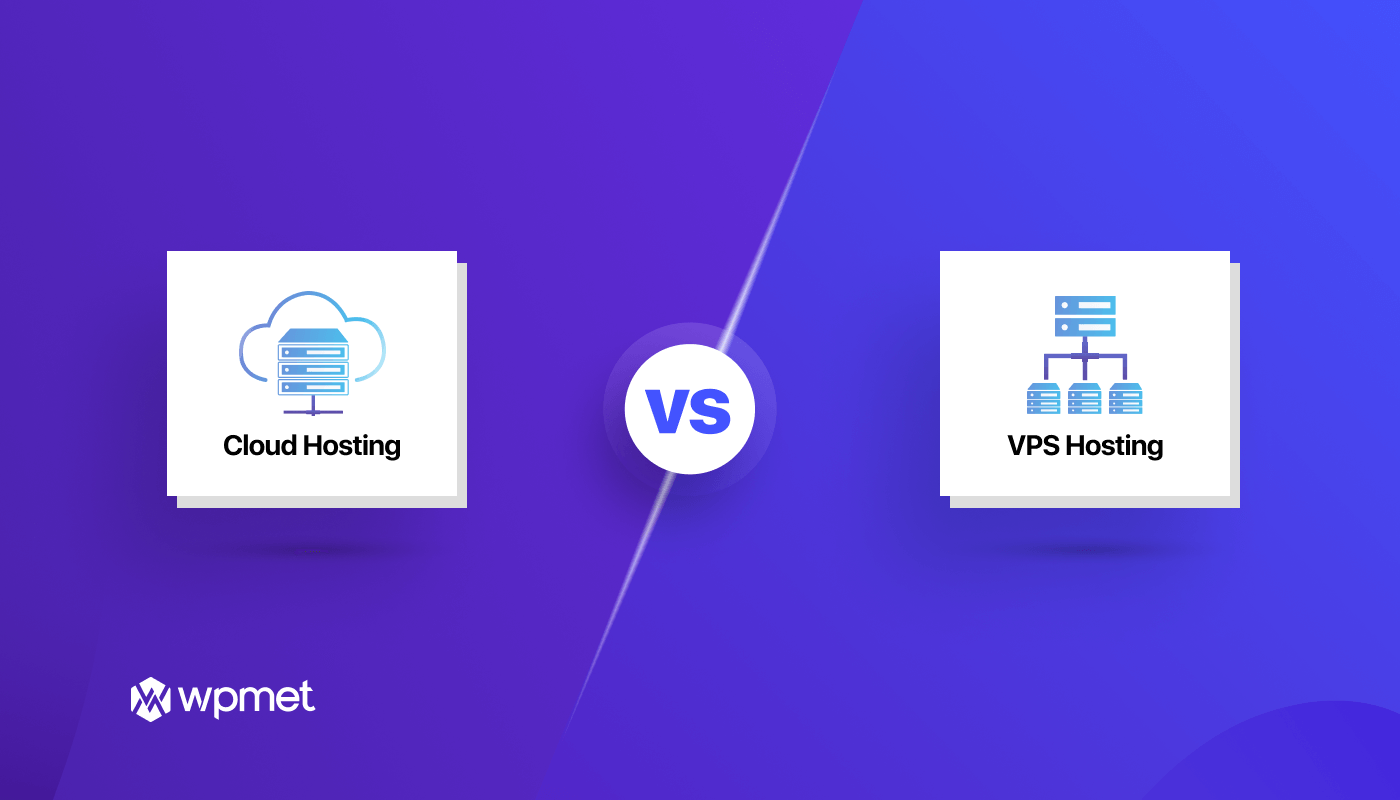If you are a website owner, a cloud of confusion can loom over you! That is the dilemma of choosing cloud hosting or VPS hosting, as each promises to address your hosting needs efficiently.
Then, which one is the right fit for expanding your blog or business website? 🤔
Don’t worry!
In this comprehensive guide, we’ll depict a head-to-head comparison of “Cloud vs VPS hosting”. We’ll demystify the technical aspects, highlighting the pros and cons of each to help you make an informed choice that aligns perfectly with your unique requirements.
Let’s begin!
What is Cloud Hosting?
Cloud hosting is like renting high-performance space on the internet to host your website or applications, where a service provider manages all the technical aspects. As a result, cloud hosting offers flexibility and reliability for websites and applications.
There are three types of cloud hosting such as:
- Public Cloud (e.g, AWS, Google Cloud)
- Private Cloud (dedicated resources within a secure cloud)
- Hybrid Cloud (a mix of both)


Good to know: Recent industry research shows that almost 90% of companies are exploring hybrid cloud hosting options.
What is VPS Hosting?
VPS Hosting, or Virtual Private Server Hosting, divides a physical server into separate virtual servers using virtualization technology among multiple users. It is like having your own private section on a shared server.
Types include:
- Managed VPS (provider handles maintenance)
- Unmanaged VPS (you manage everything)
- Semi-Managed VPS (provider helps with some aspects)


Cloud vs. VPS Hosting: 5 Key Differences You Need to Know
Both cloud and VPS hosting have revolutionized the way websites and applications are hosted and managed. However, they offer distinct advantages and capabilities to fulfill diverse hosting needs.
Let’s explore the 5 major differences between cloud hosting and VPS hosting.
1. Performance
When hosting a website or app, performance is crucial and can greatly affect user experience and online success. However, cloud and VPS hosting have their pros and cons in terms of performance.
➡️ Cloud Hosting:
- Provides high-speed performance and can instantly allocate and scale resources.
- Offers 1 Gbps port speed and bandwidth ranging from 1 TB to 20 TB depending on the provider and plan.
- Excellent redundancy, data distributed across multiple servers, often guarantees 99.9% uptime or better.
- Latency in cloud hosting is approximately 1 ms for nearby data centers to about 100 ms for distant ones.
➡️ VPS Hosting
- VPS hosting provides good speed but with fixed allocated resources.
- VPS hosting offers 100 Mbps bandwidth speed, sometimes with unlimited options.
- Its redundancy is not as robust as cloud hosting, and it varies by provider.
- No need to share resources with other sites in VPS hosting, VPS hosting usually has lower latency, typically under 10ms.
📢 Cloud vs VPS Hosting: Which Performs Better?
Cloud Hosting offers better performance and reliability compared to VPS Hosting.
Though VPS hosting has lower latency, cloud hosting can be the superior choice for high-speed performance and robust redundancy.
2. Scalability
Scalability in hosting refers to the ability to easily adjust and expand resources such as processing power, memory, and storage to accommodate increased or fluctuating demand.
Let’s compare the scalability of cloud hosting and VPS hosting:
➡️ Cloud Hosting:
- Renowned for unparalleled scalability, with instant resource scaling based on needs.
- Dynamic allocation, pay for what you use, efficient resource utilization.
- Offers auto-scaling, and adjusts resources automatically for consistent performance.
➡️ VPS Hosting:
- Less scalable; manual upgrades with potential downtime.
- Pre-allocated resources, dedicated but fixed limits; potential performance issues upon exceeding limits.
- Requires manual intervention for resource scaling; time-consuming.
📢 Cloud vs VPS Hosting: Which Has More Scalability?
In the scalability showdown, cloud hosting wins.
Its instant resource scaling and auto-scaling make it ideal for websites with varying traffic. It adapts to your needs for optimal performance, whether in peak or off-peak times.
3. Security
The security of hosting, whether it’s in the cloud or on a VPS, is a critical aspect that can have far-reaching implications for the integrity and reliability of your online operations.
Let’s see which web hosting offers your website or app a more secure online presence.
➡️ Cloud Hosting:
- Robust redundancy measures with data mirrored across multiple servers and data centers.
- Provide comprehensive firewall and security group features.
- Many cloud providers include DDoS attack mitigation services.
- Offer a range of integrated security services.
➡️ VPS Hosting:
- The level of redundancy varies based on the provider and configuration, potentially less comprehensive.
- Relies more on user management and setup, offering more control but increased user responsibility.
- Typically requires third-party services or configurations, potentially less comprehensive.
- More control and responsibility for security aspects, including server hardening, patching, and firewall configurations.
📢 Cloud vs VPS Hosting: Which is More Secure?
Cloud hosting offers stronger security features, including redundancy, DDoS protection, and integrated services, while VPS Hosting gives you more control but demands more hands-on security management.
So, in terms of security, cloud hosting wins the battle.
4. Migration and Transfer
The seamless migration and transfer of hosting services are crucial considerations when choosing between Cloud and VPS hosting solutions.
Let’s explore which web hosting is reliable in terms of smooth migration and transfer.
➡️ Cloud Hosting:
- Offers tools and services for easier migration.
- Provides robust snapshot and backup features for data protection.
- Minimizes downtime with high availability and SLAs.
- Offers a range of professional services, including consulting and support.
➡️ VPS Hosting:
- Requires more manual effort and expertise for migration.
- Snapshot and backup capabilities may vary and may be less feature-rich.
- Downtime can be more frequent and varies with the provider’s reliability.
- May offer professional services, but they are not as comprehensive or readily available.
📢 Cloud vs VPS Hosting: Which one is Easy and Fast to migrate?
Cloud Hosting emerges as the preferred choice due to its advantages in migration, data protection, and downtime, as well as the availability of comprehensive professional services compared to VPS hosting.
5. Cost Efficiency
Regarding hosting services, one critical aspect to consider is the cost. So, comparing cloud hosting and VPS hosting in terms of their pricing and overall cost-effectiveness will help you make an informed decision.
➡️ Cloud Hosting:
- Typically more expensive than VPS hosting.
- Costs depend on the number of servers and complexity, often exceeding VPS or shared hosting by 20 to 50%.
➡️ VPS Hosting:
- Generally more cost-effective compared to cloud hosting.
- Provides a budget-friendly option for hosting needs.
📢 Cloud vs VPS Hosting: Which is Cost-efficient?
In terms of cost-efficiency, VPS hosting generally offers a more flexible and scalable cost model compared to cloud hosting.
Cloud Hosting vs VPS Hosting: Pros and Cons
| Hosting Name | Pros | Cons |
|---|---|---|
| Cloud Hosting | ✅ Higher Scalability ✅ Powerful Security ✅ Resource Allocation ✅ Global Accessibility ✅ Automatic Updates | ❌ Cost Variability |
| VPS Hosting | ✅ Cost Stability ✅ Full Control ✅ Lower Latency ✅ Predictable Performance ✅ Customization Options | ❌ Limited Scalability |
Cloud Hosting vs. VPS Hosting: Which is Right for You?
Still confused after the head-to-head comparison on cloud hosting vs. VPS hosting?
Well, choosing the perfect hosting solution can be a bit like picking your ride for a digital highway. So, it’s crucial to decide whether you go for the sleek and speedy cloud sports car or the nimble and cost-effective VPS scooter.
Let’s see which is the right fit for your needs.
✅ Choose Cloud Hosting if:
- You require dynamic scalability and instant resource allocation to handle variable traffic patterns or rapid growth.
- High reliability and redundancy are crucial for your web applications.
- You value the flexibility and cost-efficiency of pay-as-you-go pricing models.
✅ Choose VPS Hosting if:
- You have a smaller website or application with consistent resource requirements and uptime guarantees.
- You prefer predictable and affordable pricing and do not anticipate frequent resource scaling.
- You are comfortable with manual server management tasks and need dedicated resources.
Cloud vs. VPS Hosting: At a Glance
| Aspect | Cloud Hosting | VPS Hosting |
|---|---|---|
| Scalability | Highly scalable, resources can be easily adjusted as needed. | Scalable but with limitations, resources depend on the plan |
| Performance | Generally offers high performance due to resource flexibility | Good performance, but limited to the allocated resources |
| Data Protection | Strong data protection with automated backup options | Data protection depends on the hosting provider’s services |
| Downtime | Lower downtime due to redundancy and high availability | More downtime is possible in case of hardware failures or maintenance |
| Ease of Migration | Easier migration with tools and flexibility | Migration may require more manual effort |
| Professional Services | Offers a wide range of professional services | Professional services available |
| Pricing Model | Pay-as-you-go, usually billed per usage or subscription. | Fixed pricing, affordable, typically monthly or annually. |
Bonus comparison blogs 🎉
1. Elementor vs Wix
2. Webflow vs WordPress
3. Gutenberg vs Elementor
4. WooCommerce vs Opencart
5. Elementor vs Divi
FAQs
Why is Web Hosting Necessary?
What is the difference between VPS and Private cloud hosting?
What is the difference between VPS and Cloud VPS?
Final Words
To sum up, if scalability, flexibility, and a pay-as-you-go model are your top priorities, cloud hosting can be the ideal choice. It provides the ability to adapt resources on the fly and suits businesses with fluctuating demands.
On the other hand, VPS Hosting is well-suited for those seeking a balance between performance and affordability.
Overall, this head-to-head comparison of “Cloud vs. VPS hosting” will help you to choose the best hosting services that align with your specific goals and can support your online presence effectively.



Leave a Reply